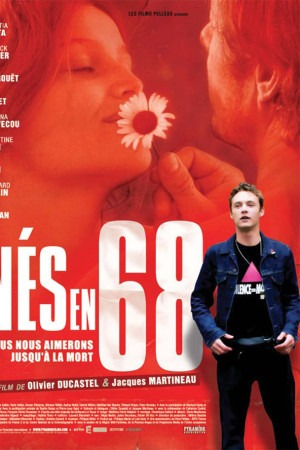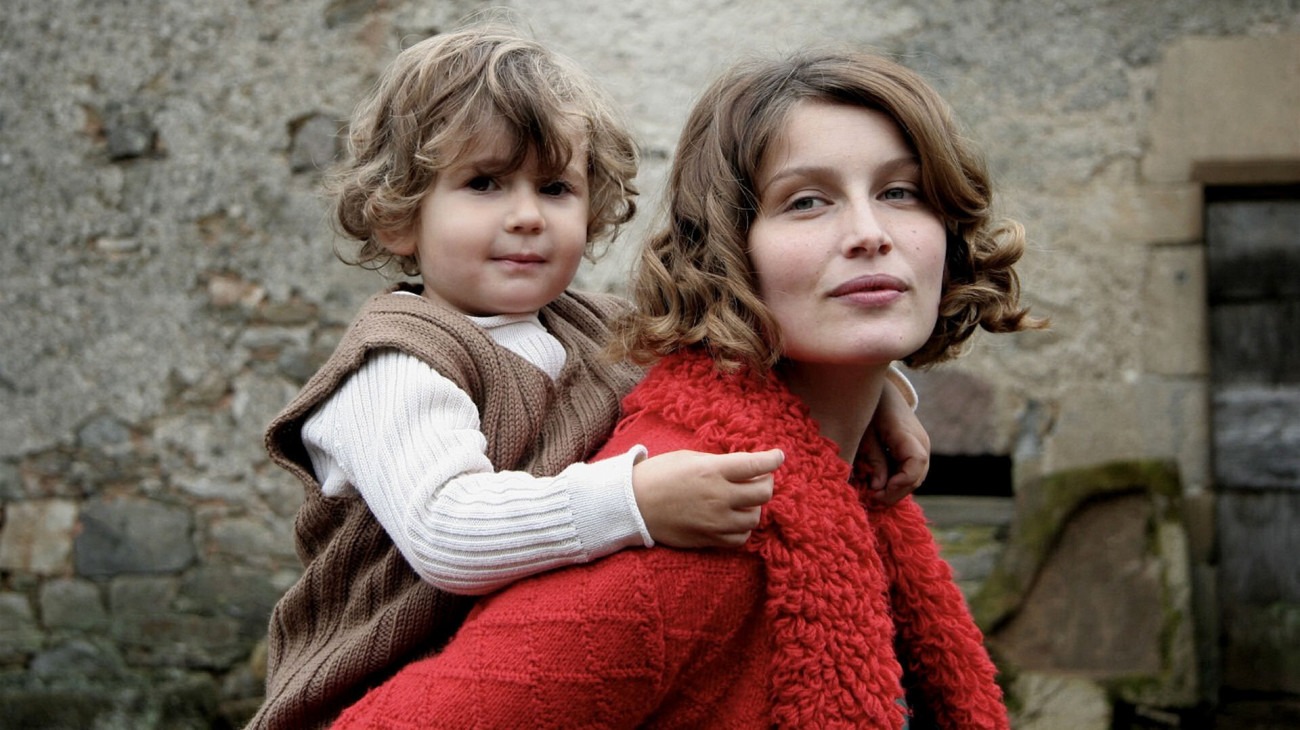
The 44th Chicago International Film Festival
Olivier Ducastel & Jacques Martineau's messy epic-length study of the political radicals of the 1960s and what happened after, Born in '68 doesn't commit the great sin typical of films about that era, which is to suggest that the '60s were the greatest and most beautiful moment in human history, and that we shall never see times like those again. In fact the main thrust of the movie is seemingly to explode that myth, though the narrative sprawl and vast number of characters involved makes it somewhat hard to tell precisely what argument the directors are putting forth. At times the film seems to argue against those who abandoned the utopian dreams of the '60s as being the reason those dreams failed, and at times it seems to mock those who stuck with it all as recklessly naïve. Damned if you, damned if you don't, I guess. At any rate, I'm reasonably certain that the directors aren't trying to argue that the hippies are responsible for AIDS, although the way the film is structured, it's not as weak of a misreading as you might believe.
Opening in 1968 in Paris, the film generally follows the life of Catherine (Lætitia Casta), a young revolutionary in love with the handsome Yves (Yannick Renier), with whom she settles down at a commune several hours into the countryside. For many years, Catherine, Yves and their friends, including the more violent radical Hervé (Yann Trégouët) enjoy the simple life of farming and free love, but as the '70s crawl on, fewer and fewer people are willing to live that life, until eventually Catherine is left with just her two children by Yves, Ludmilla and Boris, fellow flower child and American ex-pat Caroline (Kate Moran), and the kindly non-hippies down the road, Maryse (Christine Citti) and her husband Serge (Marc Citti, Christine's brother). As the years roll on, Ludmilla and Boris grow into adults (played by Sabrina Seyvecou and Théo Frilet), and while Boris is mostly happy to live in what remains of the commune, helping his mother and sleeping with Maryse's son Christophe (Edouard Collin), Ludmilla grows increasingly irritated at Catherine's monkish life and holier-than-thou outlook.
The curious and at times alienating problem (if that's the word) with Born in '68 is essentially structural: though everything about the film's narrative and the way it is presented hews very closely to one of those generational epics like Giant or How the West Was Won, it's not especially interested in recreating those films' novelistic approach to character and theme. In fact, Born in '68 isn't particularly interested with character at all; with the possible exception of Catherine herself, every character represents some sociopolitical concept, and the end result isn't a family epic so much as it is a nearly three-hour editorial of leftist history. In other words, a French art film. Yves isn't just some guy who can't hack it on a farm; he's the embodied False Revolutionary Bourgeoisie; Boris isn't a young gay man who falls in love and must confront prejudice, he's Homosexuality In A Homophobic Culture During The AIDS Crisis. And so forth.
Honestly, it's not as bad as that, if only because turning everyone into an allegory lets the directors mount a fairly comprehensive investigation into the ways that the needlessly idealistic '60s leftists screwed things up for the '80s and '90s leftists; but also how the younger generation failed to take advantage of their parents' legitimate achievements because of what amounts to adolescent pique. It does make for a film that talks at you much more frequently than it moves you, and that can be frustrating at times, but at least what it has to say is generally intelligent.
With all that said, it is still a movie, and must function in the way that movies do. It does so well enough to get by, though without any special distinction: Ducastel and Martineau do not use wit if they can get by doing whatever is typical and invisible, although there are several long takes (particularly in the early, "yay for our commune!" section of the film) that are especially pleasing, giving a somewhat unwarranted feeling that we're watching documentary footage rather than a polished movie. And they must have done something right to keep the film as quick-paced as it is, doubly so when you recall that this is basically a political essay. Though there are laggy moments, I never felt the lengthy running time, and if not for the film's very clear Wrapping Up, I'd have been surprised that the end came so soon.
Leaving, I suppose, the actors; but that's not entirely fair. They're playing concepts, not characters, and it shows in virtually every performance. Although to be fair to Casta and Rennier, they're both very credible as young hippies and almost 40 years later, as tired grandparents. This despite some truly ineffective aging make-up, in which Casta is given liver spots but keeps her smooth model's skin (for Casta is indeed an ex-model, and gives one of the finest performances that anyone with that particular handicap ever has).
I have a strong suspicion that this is the kind of film that only really works at all in a festival setting. The non-stop political hammering really isn't cinematic, and it only works if you go in entirely prepared to think very hard; and you learn to expect that sort of thing when you're seeing a pretentious European movie every other day. Still, Born in '68 is an obvious work of passion by two men who have a great many thoughts that they're trying to express in the clearest and most concise way possible. Take it as a lecture instead of a movie, and it's a pretty entertaining lecture, indeed.
7/10
Opening in 1968 in Paris, the film generally follows the life of Catherine (Lætitia Casta), a young revolutionary in love with the handsome Yves (Yannick Renier), with whom she settles down at a commune several hours into the countryside. For many years, Catherine, Yves and their friends, including the more violent radical Hervé (Yann Trégouët) enjoy the simple life of farming and free love, but as the '70s crawl on, fewer and fewer people are willing to live that life, until eventually Catherine is left with just her two children by Yves, Ludmilla and Boris, fellow flower child and American ex-pat Caroline (Kate Moran), and the kindly non-hippies down the road, Maryse (Christine Citti) and her husband Serge (Marc Citti, Christine's brother). As the years roll on, Ludmilla and Boris grow into adults (played by Sabrina Seyvecou and Théo Frilet), and while Boris is mostly happy to live in what remains of the commune, helping his mother and sleeping with Maryse's son Christophe (Edouard Collin), Ludmilla grows increasingly irritated at Catherine's monkish life and holier-than-thou outlook.
The curious and at times alienating problem (if that's the word) with Born in '68 is essentially structural: though everything about the film's narrative and the way it is presented hews very closely to one of those generational epics like Giant or How the West Was Won, it's not especially interested in recreating those films' novelistic approach to character and theme. In fact, Born in '68 isn't particularly interested with character at all; with the possible exception of Catherine herself, every character represents some sociopolitical concept, and the end result isn't a family epic so much as it is a nearly three-hour editorial of leftist history. In other words, a French art film. Yves isn't just some guy who can't hack it on a farm; he's the embodied False Revolutionary Bourgeoisie; Boris isn't a young gay man who falls in love and must confront prejudice, he's Homosexuality In A Homophobic Culture During The AIDS Crisis. And so forth.
Honestly, it's not as bad as that, if only because turning everyone into an allegory lets the directors mount a fairly comprehensive investigation into the ways that the needlessly idealistic '60s leftists screwed things up for the '80s and '90s leftists; but also how the younger generation failed to take advantage of their parents' legitimate achievements because of what amounts to adolescent pique. It does make for a film that talks at you much more frequently than it moves you, and that can be frustrating at times, but at least what it has to say is generally intelligent.
With all that said, it is still a movie, and must function in the way that movies do. It does so well enough to get by, though without any special distinction: Ducastel and Martineau do not use wit if they can get by doing whatever is typical and invisible, although there are several long takes (particularly in the early, "yay for our commune!" section of the film) that are especially pleasing, giving a somewhat unwarranted feeling that we're watching documentary footage rather than a polished movie. And they must have done something right to keep the film as quick-paced as it is, doubly so when you recall that this is basically a political essay. Though there are laggy moments, I never felt the lengthy running time, and if not for the film's very clear Wrapping Up, I'd have been surprised that the end came so soon.
Leaving, I suppose, the actors; but that's not entirely fair. They're playing concepts, not characters, and it shows in virtually every performance. Although to be fair to Casta and Rennier, they're both very credible as young hippies and almost 40 years later, as tired grandparents. This despite some truly ineffective aging make-up, in which Casta is given liver spots but keeps her smooth model's skin (for Casta is indeed an ex-model, and gives one of the finest performances that anyone with that particular handicap ever has).
I have a strong suspicion that this is the kind of film that only really works at all in a festival setting. The non-stop political hammering really isn't cinematic, and it only works if you go in entirely prepared to think very hard; and you learn to expect that sort of thing when you're seeing a pretentious European movie every other day. Still, Born in '68 is an obvious work of passion by two men who have a great many thoughts that they're trying to express in the clearest and most concise way possible. Take it as a lecture instead of a movie, and it's a pretty entertaining lecture, indeed.
7/10






